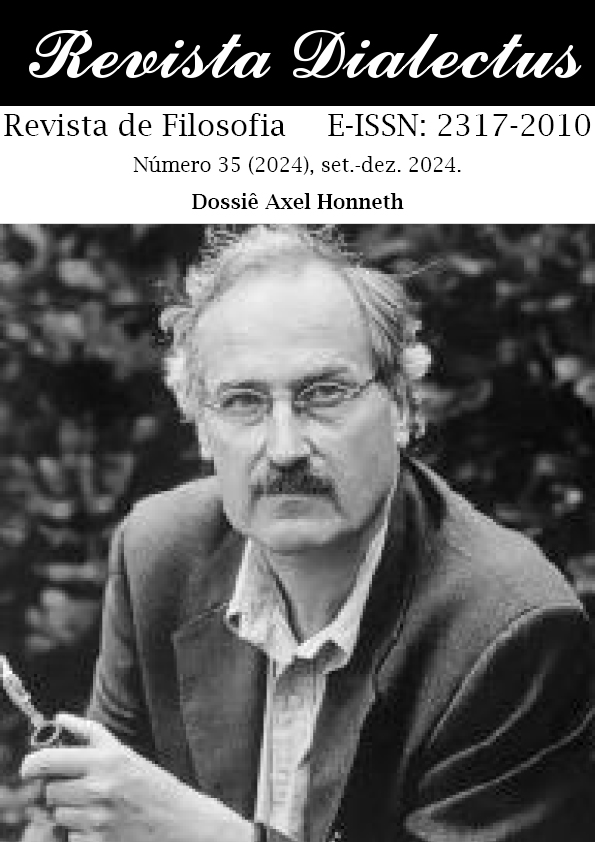A CRÍTICA DE NANCY FRASER A AXEL HONNETH: AS FALHAS DA JUSTIÇA MONISTA
DOI:
https://doi.org/10.30611/2024n35id94734Keywords:
Justiça, Redistribuição, Reconhecimento, Fraser, HonnethAbstract
Nancy Fraser é uma das críticas mais contundentes à teoria do reconhecimento de Honneth. A proposta honnethiana na sua interpretação tem falhas que comprometem o seu legado crítico: ao pensar a justiça apenas como vinculada ao reconhecimento, Honneth não analisa os processos capitalistas e as suas consequências socioeconômicas para a vida prática dos sujeitos e grupos. Uma visão monista de justiça como a de Honneth enfraquece a crítica, distorce o diagnóstico da realidade e o potencial de emancipação dos sujeitos. Como alternativa à visão monista de Honneth, Fraser propõe uma concepção bidimensional de justiça que leva em consideração o reconhecimento e a redistribuição com vistas a garantir a paridade de participação dos sujeitos na esfera pública.
References
FRASER, Nancy. Justice interrupts critical reflection on the “post socialist” condition. New York: Routledge, 1997.
FRASER, Nancy; HONNETH, Axel. ¿Redistribución o reconocimiento? Un debate político-filosófico. Madrid: Morata, 2006.
FRASER, Nancy. Reconhecimento sem ética? In: SOUSA, Jessé; MATTOS, Patrícia (Orgs.). Teoria crítica no século XXI. São Paulo: Annablume, 2007. (Crítica Contemporânea), p. 113 – 140.
HABERMAS, Jürgen. A inclusão do outro: estudos de teoria política. Trad. George Sperber; Paulo Soethe. São Paulo: Loyola, 2002.
HEGEL, Georg. W. F. El sistema de la eticidade. Edición preparada por Dalmacio
Negro Pavón y Luis González-Hontoria. Madrid: Editora Nacional, 1983.
HONNETH, Axel. Luta por reconhecimento: a gramática moral dos conflitos sociais. Trad. Luiz Repa. São Paulo: Editora 34, 2003.
HONNETH, Axel. O direito da liberdade. Trad. Saulo Krieger. São Paulo: Martins Fontes, 2015.
LIMA, Francisco Jozivan Guedes de. Fraser Vs. Honneth: Redistribuição e Reconhecimento Considerações sobre
um modelo monista e dual de justiça. In: TAUCHEN, Jair (et. al). (Org.). XV Semana
Acadêmica do PPG em Filosofia da PUCRS. 1ed. Porto Alegre: Editora Fi. v. 3,
, p. 206-220.
PEREIRA, Gustavo. Las voces de la igualdad. bases para una teoría crítica de la justicia. Capellades, España: Editorial Proteus, 2010.
ROSENFIELD, Cinara.; SAAVEDRA, Giovani. Reconhecimento, teoria crítica e sociedade: sobre desenvolvimento da obra de Axel Honneth e os desafios de sua aplicação no Brasil. Sociologias, Porto Alegre, ano 15, nº 33, mai./ago. 2013, p. 14 - 54.
SOBOTTKA, Emil. A liberdade individual e suas expressões institucionais. Revista Brasileira de Ciências Sociais (Impresso), v. 27, p. 219-223, 2012.
WERLE, Denilson; MELO, Rúrion. Reconhecimento e justiça na teoria crítica da sociedade em Axel Honneth. In:
NOBRE, Marcos. (Org). Curso livre de teoria crítica. 3ª Ed. Campinas, SP: Papirus,
, p. 183 – 198.
ZURN, Cristopher. Axel Honneth. Malden, MA: Polity Press, 2015.
ZURN, Cristopher. Identity or Status? Struggles over Recognition. Struggles over Recognition in Fraser, Honneth, and Taylor. Constellations, v. 10, n. 4, p. 519-537, 2003.
Downloads
Published
Issue
Section
License
Copyright (c) 2024 Francisco Jozivan Guedes de Lima, Vigevando Araújo de Sousa

This work is licensed under a Creative Commons Attribution-NonCommercial-NoDerivatives 4.0 International License.
Authors who publish in this journal agree to the following terms:
- Authors retain the copyright and grant the journal the right of first publication, with the work simultaneously licensed under the Attribution-NonCommercial-NoDerivatives 4.0 International (CC BY-NC-ND 4.0) License, which allows the non-commercial sharing of work, without modifications and with acknowledgment of authorship and initial publication in this journal.
- Authors are authorized to take additional contracts separately, for non-exclusive distribution of the version of the work published in this journal (eg publish in institutional repository or as a book chapter), with acknowledgment of authorship and initial publication in this journal.
- Authors are allowed and encouraged to publish and distribute their work online (eg in institutional repositories or on their personal page) at any point before or during the editorial process, as this can generate productive changes as well as increase the impact and citation of published work (See The Free Access Effect).



















